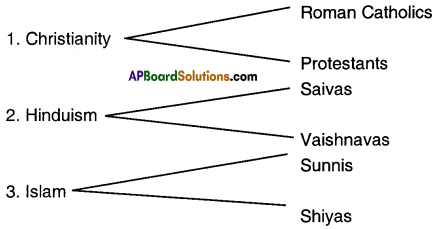SCERT AP Board 8th Class Social Solutions 20th Lesson Understanding Secularism Textbook Questions and Answers.
AP State Syllabus 8th Class Social Studies Solutions 20th Lesson Understanding Secularism
8th Class Social Studies 20th Lesson Understanding Secularism Textbook Questions and Answers
Improve your learning
![]()
Question 1.
List the different types of religious practices that you find in your neighbourhood. This could be different forms of prayer, worship of different gods, sacred sites, different kinds of religious music and singing. Does this indicate freedom of religious practice?
Answer:
| Issues | Hindus | Christians | Muslims |
| 1) Different forms of prayer | Ashtottarams, Pujas, Abhishekas, Homas | Prayers | Namaj |
| 2) Worship of different gods | Brahma, Vishnu, Maheswara, Saraswathi, Lakshmi, Parvathi and others. | Christ and Mary Matha | Allah, Mohammad |
| 3) Sacred sites | Varanasi, Haridwar – Madurai, Rameswaram, Allahabad etc. | Israel and Nagapatnam in India | Mecca Madina & Dargahs |
| 4) Different kinds of religious music | Keertanalu, Tatwalu etc. Annamayya, Thyagayya | Jesudas and others | Prayers only |
| 5) Singing | Vengamamba, ‘Bala Murali Krishna’ etc. | Melodious songs | Prayers only |
These indicate freedom of religious practice.
Question 2.
Will the government intervene if some religious group says that their religion allows them to practise infanticide? Give reasons for your answer.
Answer:
The government intervenes in this issue.
Reasons:
- In Indian secularism the state can intervene in religious affairs.
- This interference will be according to the ideals of the Constitution.
![]()
Question 3.
Find out some examples of different views within the same religion.
Answer:
Yes, there are 3 main schools of thoughts in Buddism.
- Theravada
- Mahayana
- Vajrayana
1. Theravada: They believe in self enlightenment.
2. Mahayana: In the course of enlightenment themselves, they vow to help other to the stage of enlightenment.
3. Vajrayana: They believe that not only bring others to enlightenment but also have power to do that.
Thus there are different views in same religion.
Question 4.
The Indian State both keeps away from religion as well as intervenes in religion. This idea can be quite confusing. Discuss this once again in class using examples from the chapter as well as those that you might have come up with.
Answer:
The Indian Constitution mandates that the Indian State be secular. This is according to the ideals of our Constitution, e.g.:
- The Constitution banned the ‘untouchability’.
- The Indian Muslim women are eligible for maintenance even though it is against Muslim Law. (Judgement was given by the Supreme Court in Shabano case)
- The government gives financial aid to religious educational institutions like Sisu Vidya Mandirs, RCM Schools and Urdu Schools etc.
- Similarly to ensure that laws relating to equal inheritance rights are respected.
- The government takes pearls and silk clothes to Ontimitta Ramalayam in Ekasilanagaram, Cuddapah on the celebration of Seetha Ramula Kalyanam.
- In the month of Ramzan the government gives permission to the Muslim employees to do Namaj and change their work timings.
Thus our government is secular and interferes in the religious matters.
![]()
Question 5.
Read the paragraph under the heading ‘What is Secularism?’ and comment on it.
Answer:
- Secularism refers to the separation of religion from the State.
- The Constitution of India mandates that the Indian State be Secular.
- So the government stays away from the religion.
- The Indian secularism works to prevent the domination of a religion through a strategy of non-interference.
- When time comes, the Indian State interferes in religious matters.
8th Class Social Studies 20th Lesson Understanding Secularism InText Questions and Answers
Question 1.
In what way is Indian secularism different from that of other democratic countries? (Textbook Page No. 225)
Answer:
The governments of other democratic countries will not interfere in the religions of its people. But the Indian government interferes in the religious matters. Thus it is different from other democratic countries
Question 2.
Re-read the introduction to this chapter. Why do you think retaliation is not the proper response to this problem? What would happen if different groups followed this path?
(Textbook Page No. 223)
Answer:
I think retaliation in not the proper response to this problem because, it is not the solution. We are living in a secular country. We follow the principles of great personalities like Gandhiji, Buddha, Ambedkar etc. If this path of retaliation is followed – non-voilence would prevail everywhere and we can see unrest in the society.
![]()
Question 3.
Can there be different views within the same religion? (Textbook Page No. 224)
Answer:
There can be different views within the same religion. Many religions in the world have different views.
For e.g.:

By observing all these we can say that all the famous religions have different views.
Question 4.
Can you think of a recent incident, from any part of India, in which the secular ideals of the Constitution were violated and persons were persecuted and killed because of their religious backgrounds? (Textbook Page No. 226)
Answer:
Not in recent past, but in 2002 Gujarat violence was a series of incidents starting with the Godra train burnings and the subsequent communal violence between Hindus and Muslims in the Indian state of Gujarat.
On 27.4.2002 the Sabarmathi Express train was attacked at Godra by a Muslim mob.
58 Hindu pilgrims returning from Ayodhya were killed in the attack. Out of them 25 were women, 15 were children. This in turn prompted retaliatory attacks against Muslims and general communal riots on a large scale across the state.
Later it was known that it was a preplanned attack.
![]()